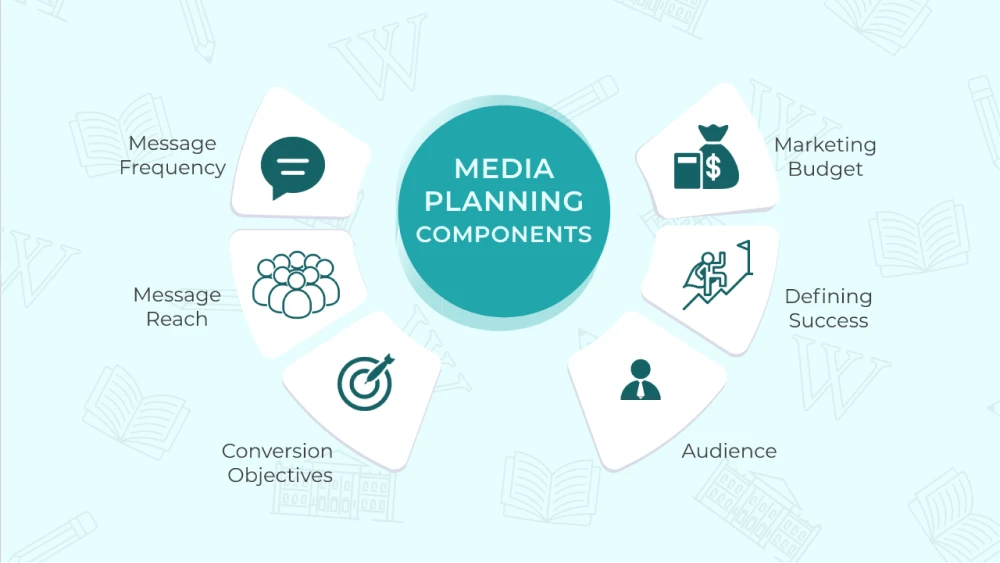Effective app marketing campaigns are not a stroke of luck; they require meticulously crafted media strategies. Media planning holds a crucial position within the digital marketing ecosystem.
Whether launching a new app or enhancing existing outreach, a well-structured media plan serves as a guiding path toward achieving marketing goals with precision.
Mobupps offers insight into media planning and comprehensive, step-by-step guidance to enrich your understanding and bolster your prospects for marketing success.
The media plan comprises four essential components:
1. Research and Analysis: This involves understanding your target audience, market segment stakeholders, insights gained from previous campaigns, and analyzing competitors within your industry.
2. Marketing Objectives and Key Performance Indicators (KPIs): Define your primary business objectives, and the key metrics you'll use to gauge success. These metrics can range from conversion rates to social media engagement metrics to cost per click or acquisition.
3. Media Strategy: Outline your budget, preferred media channels, messaging, CTA, ad specifications, deliverables, and project timeline. Additionally, identify media to avoid, both paid and unpaid.
4. Implementation, Evaluation, and Measurement: Detail the launch strategy, monitoring methods, and how you'll measure the ad campaign effectiveness over time.

Creating a media plan offers numerous advantages for a business, such as:
1. Enhancing understanding of your audience on a deeper level.
2. Improving communication with your audience in a more targeted manner.
3. Streamlining marketing activities for better efficiency.
4. Tracking campaign progress and activities.
5. Improving campaign effectiveness through optimization.
6. Staying abreast of current media trends.
7. Contributing to overarching business objectives, including customer base expansion and revenue growth.

You may wonder if you can jump straight to more exciting things like testing creatives, optimizing campaigns, and making a profit. But skipping media planning can have significant negative impacts on a marketing campaign:
1. Inefficient Resource Allocation: Without a plan, resources such as budget and time may be allocated occasionally, leading to wastage and suboptimal results.
2. Ineffective Targeting: Lack of audience research and analysis may result in targeting the wrong demographics or failing to reach the intended audience at all.
3. Poor Messaging: Without a clear plan for messaging and positioning, communication with the audience may be inconsistent or ineffective, resulting in low engagement and conversion rates.
4. Missed Opportunities: A lack of strategy means missing out on potential opportunities to leverage various media channels and tactics effectively.
5. Inability to Measure Success: It becomes easier to accurately evaluate the campaign's success with predefined objectives and KPIs. This hinders the ability to learn from mistakes and improve future efforts.
6. Wasted Budget: Ad hoc decisions can lead to overspending on ineffective channels or tactics, resulting in a poor ROI and wasted budget.

Overall, skipping media planning can lead to subpar outcomes and hinder the achievement of marketing objectives.
Think of your media plan as a roadmap that directs your strategies and objectives while remaining flexible to accommodate changes based on real-world outcomes. Flexibility is essential because achieving success in app marketing demands a blend of structured planning and the ability to adapt swiftly.
Whether you're fine-tuning audience targeting, exploring fresh ad formats, or adjusting campaign budgets, your media plan serves as the base of your marketing strategy. Let it lead the way, yet remain ready to revise as you progress towards your goals.
Effective app marketing campaigns are not a stroke of luck; they require meticulously crafted media strategies. Media planning holds a crucial position within the digital marketing ecosystem.
Whether launching a new app or enhancing existing outreach, a well-structured media plan serves as a guiding path toward achieving marketing goals with precision.
Mobupps offers insight into media planning and comprehensive, step-by-step guidance to enrich your understanding and bolster your prospects for marketing success.
The media plan comprises four essential components:
1. Research and Analysis: This involves understanding your target audience, market segment stakeholders, insights gained from previous campaigns, and analyzing competitors within your industry.
2. Marketing Objectives and Key Performance Indicators (KPIs): Define your primary business objectives, and the key metrics you'll use to gauge success. These metrics can range from conversion rates to social media engagement metrics to cost per click or acquisition.
3. Media Strategy: Outline your budget, preferred media channels, messaging, CTA, ad specifications, deliverables, and project timeline. Additionally, identify media to avoid, both paid and unpaid.
4. Implementation, Evaluation, and Measurement: Detail the launch strategy, monitoring methods, and how you'll measure the ad campaign effectiveness over time.

Creating a media plan offers numerous advantages for a business, such as:
1. Enhancing understanding of your audience on a deeper level.
2. Improving communication with your audience in a more targeted manner.
3. Streamlining marketing activities for better efficiency.
4. Tracking campaign progress and activities.
5. Improving campaign effectiveness through optimization.
6. Staying abreast of current media trends.
7. Contributing to overarching business objectives, including customer base expansion and revenue growth.

You may wonder if you can jump straight to more exciting things like testing creatives, optimizing campaigns, and making a profit. But skipping media planning can have significant negative impacts on a marketing campaign:
1. Inefficient Resource Allocation: Without a plan, resources such as budget and time may be allocated occasionally, leading to wastage and suboptimal results.
2. Ineffective Targeting: Lack of audience research and analysis may result in targeting the wrong demographics or failing to reach the intended audience at all.
3. Poor Messaging: Without a clear plan for messaging and positioning, communication with the audience may be inconsistent or ineffective, resulting in low engagement and conversion rates.
4. Missed Opportunities: A lack of strategy means missing out on potential opportunities to leverage various media channels and tactics effectively.
5. Inability to Measure Success: It becomes easier to accurately evaluate the campaign's success with predefined objectives and KPIs. This hinders the ability to learn from mistakes and improve future efforts.
6. Wasted Budget: Ad hoc decisions can lead to overspending on ineffective channels or tactics, resulting in a poor ROI and wasted budget.

Overall, skipping media planning can lead to subpar outcomes and hinder the achievement of marketing objectives.
Think of your media plan as a roadmap that directs your strategies and objectives while remaining flexible to accommodate changes based on real-world outcomes. Flexibility is essential because achieving success in app marketing demands a blend of structured planning and the ability to adapt swiftly.
Whether you're fine-tuning audience targeting, exploring fresh ad formats, or adjusting campaign budgets, your media plan serves as the base of your marketing strategy. Let it lead the way, yet remain ready to revise as you progress towards your goals.

